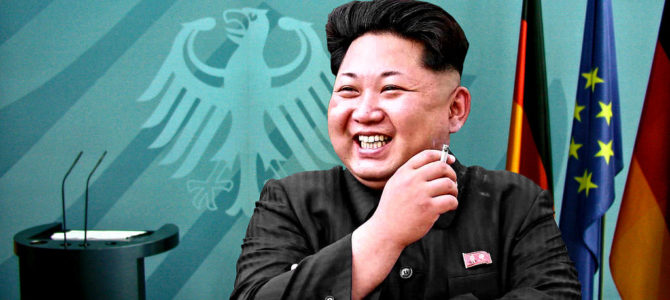Okay folks, tomorrow’s the day. President Donald Trump and North Korean leader Kim Jong Un will meet in Singapore, marking the first time a sitting U.S. president has met with the leader of North Korea since the country’s founding in 1948 by Kim’s grandfather, Kim Il Sung.
Kim is no doubt doing his grandpa proud, not only by realizing the founder’s aspirations that his country would one day obtain nuclear weapons, but by winning recognition from the international community.
Of course, the international community, especially South Korea, doesn’t see it that way.
To them, Kim is finally coming to his senses about Pyongyang’s illicit nuclear program — coming hat in hand, apologizing for his folly. But the reality is that Kim terrified the world with the uptick in nuclear and ballistic missiles tests over the last two years, and the world is anxious, even desperate, to get him to stop.
That’s a dangerous negotiating position to be in, and it’s dangerous for America’s allies as well. Japanese President Shinzo Abe met with Trump in Washington last Thursday to talk about tomorrow’s summit. Abe is, not surprisingly, worried that the United States will end up easing up on Trump’s policy of “maximum pressure” on Pyongyang without getting any major concessions in return. And while Trump likes to talk tough, and probably considers himself to have the upper hand after he unexpectedly called off the summit last month, he also said last week that he doesn’t want to talk about maximum pressure anymore, even though those measures remain in place.
Ultimately, what everyone wants to know is what will happen tomorrow. Despite all the speculation — and there’s a lot of it — no one really knows how this whole thing will play out. We know that former NBA star and all-around weirdo Dennis Rodman will be there (in 2013, Rodman declared the North Korean dictator was his “friend for life”). We know that Secretary of State Mike Pompeo said that the U.S. will offer North Korea “unique” security assurances in return for a complete and irreversible dismantling of its nuclear program. Pompeo also said that Kim personally assured him that he’s willing to give up his country’s nukes.
We also know that North Korea didn’t fly to Singapore in his official plane. Instead, he travelled there in an Air China jet, a sign that China is keeping close tabs on Kim and that Beijing wants to make it clear at the outset of the summit that it will have a seat at the table, one way or another.
And while we don’t know how Kim will behave in a high-stakes nuclear negotiation, we do know what his father and grandfather did in 1994 and again in 2006: they lied about giving up North Korea’s nuclear program, reaped the economic benefits, and carried on developing a nuclear bomb.
Now that North Korea is a bona fide nuclear power, the stakes are even higher and the Trump administration’s challenge is even more daunting: to convince Pyongyang to give up the one thing it has sought for decades, and has finally just obtained.









